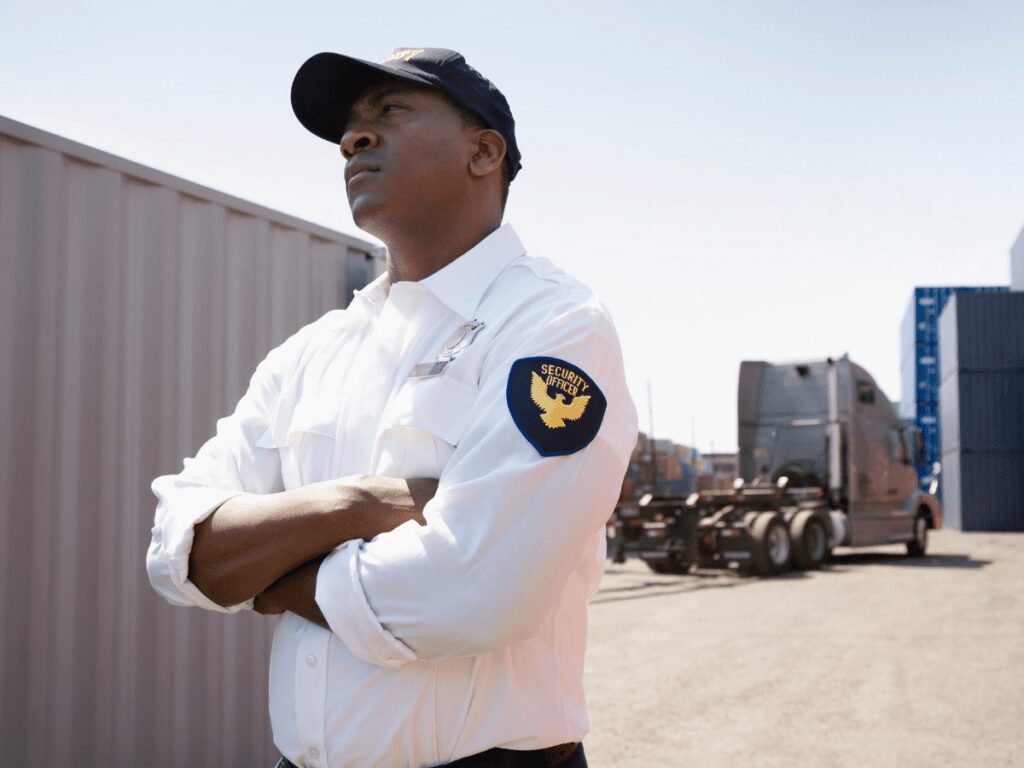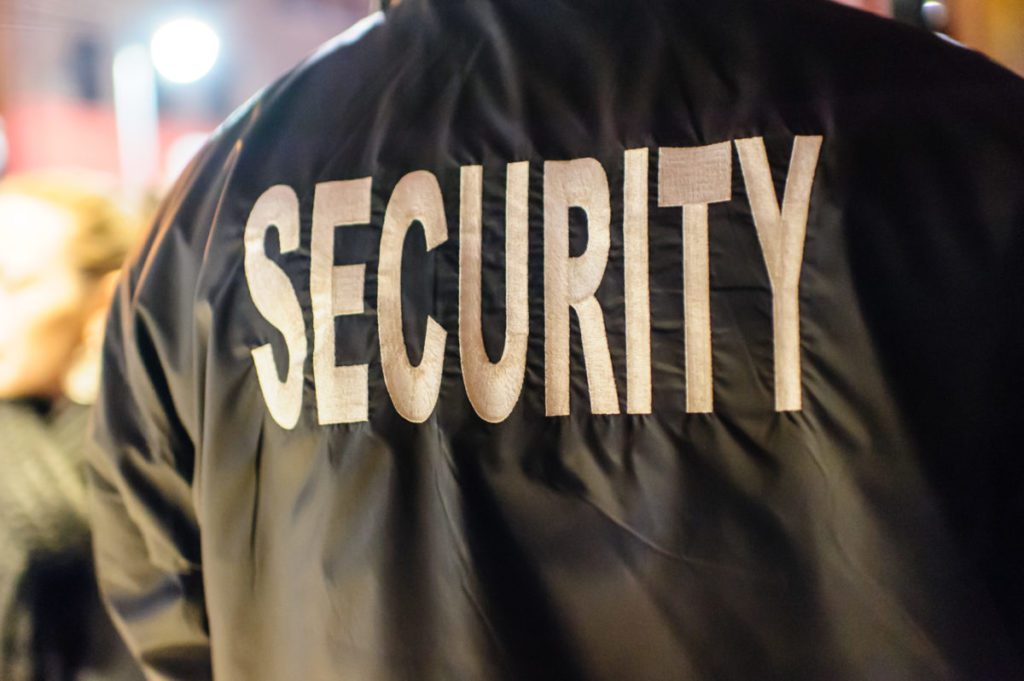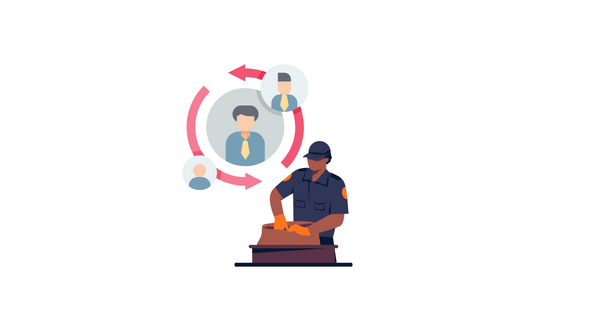Did you know the security guard turnover rate can exceed 300%, depending on the organization?
Yes, turnover occurs everywhere. People look for employment closer to home, pays more, or is more enticing. However, a high turnover rate is prevalent in the security industry. You may be wondering why security guards resign more frequently than other professionals.
We wrote a blog on employee turnover in the security industry, discussing the consequences of security guard turnover and ways to reduce it.
But it’s difficult to explain the true causes of security guard turnover. Why is that? Every individual working in the industry has a unique set of reasons for leaving. Nevertheless, we hope to look at some common causes of security guard turnover in this blog.
Understanding Security Guard Turnover

The security guard turnover rate is the number of security guards or officers who leave a firm at a specific time, generally a year. Security firms typically document the overall number of security guards leaving, but turnover may also pertain to specific divisions or demographic groups within the security organization. Security guard turnover encompasses everything from resignations to terminations and is a factor in your turnover rate estimation.
Many security organizations have high turnover rates, leading to increased operating costs, difficulty providing services, and other business-related issues. The negative impacts of turnover significantly impact the business, both operationally and financially. That is why there is a significant emphasis on employee retention in the security industry. So, let us investigate the causes of excessive security guard turnover!
Low wages
One of the most prominent reasons for high-security guard turnover is the lack of Compensation:
- In the United States, approximately 1,057,000 security guards work in the outsourced contract security industry.
- Of that number, 666,020 security guards worked under investigation and security services. They earned an average of $16.24 per hour.
- Within that population, security companies paid more than 50% of the workers less than $15.13 per hour.
Given that this industrial category primarily consists of institutions that provide investigation and detective services, guard and patrol services, armored vehicle services, and security system services, the necessity for such professionals is critical in today’s society. One would typically expect the security guards’ wages to be high.
To provide a fair comparison, the United States employs around 127.16 million people. The mean annual wage in the United States is $53,383, while the median yearly pay is $34,612, implying that a higher proportion of the U.S. population earns less than two-thirds of the mean annual salary.
Any security guard earning an hourly rate of $16.24 would only make $33,780 per year in the security profession. Being a security guard in the United States is not high paying. Around 10% of the highest-paid security guards make more than the average yearly income.
Lack of training and support

Despite playing a more significant role in the aftermath of 9/11, the security guard business is still hampered by poor training and standards in many states, according to new research by criminologists at Michigan State University.
- Compared to other private vocations such as paramedics, daycare workers, and even cosmetologists, formal training of the nation’s one million-plus private security personnel is generally overlooked.
- Security guards, on the whole, feel unprepared to deal with difficult people and violent altercations, let alone protect themselves. In the $7 billion-a-year business, they firmly support the necessity for structured and uniform training.
- Since 1980, the number of unarmed security guards has virtually quadrupled, reaching over 1.1 million, compared to approximately 833,000 police officers. Following the 9/11 attacks, the fear of terrorism boosted awareness of security guards’ role in intelligence sharing with law authorities.
This study, published in Security Journal, discovered no significant rise in the stringency of industry rules since 1982. Indeed, many states still lack training standards, meaning that security guards must learn on the job if their employer does not provide training. In contrast, others do not need minimum education or a criminal background check for guards.
A second study, published in Security Journal, conducted in-depth interviews with security specialists. It stated that while some guards could adjust owing to previous experience as police officers, many others saw a lack of training as a hindrance to successfully performing their responsibilities. All these studies suggested that the lack of training requirements and standards has directly resulted in high-security guard turnover.
High Risks
A security guard’s job is critical for securing private property and the individuals who live or work on the premises they protect. However, there are some risks that security guards frequently confront that security managers should be aware of to avoid responsibility or damage. These risks act as a deterrent for security guards to keep this job. Here are three of the most prevalent.
Interference Risks
When multiple firms collaborate, security guards have inherent hazards that may result in accidents because the client or security company lacks an understanding of safety measures. As a result, if operations are not adequately coordinated or there is a level of disorder, security personnel may become confused about everyone’s duties and responsibilities.
Security firms that operate within the bounds of their clients’ businesses must cope with these interference issues. As a result, it is critical to take preventative actions such as communicating risk information, coordinating preventive measures, and implementing health provisions.
Specific risks in security activities
There are various risks associated with security activities. Here are a few of the most prevalent issues that security guard businesses must deal with:
- Workplace violence: Any physical violence is an example of workplace violence. It can also involve sexual harassment, bullying, and weapon-based intimidation.
- Dangers associated with dogs: Poorly trained guard dogs might exhibit unpredictable and violent behavior. Security companies should teach dogs appropriately to avoid this.
- Handling Weapons: Poor weapon handling can be dangerous. Proper weaponry training is important to minimize significant injury.
- Radiation Exposure: Radiation exposure can be harmful, and training is necessary to prevent it. Security guards are prone to radiation exposure in various locations, such as hospitals and labs.
- Risk considerations: Organizational risk factors, such as working alone and restrictive work schedules, might endanger the health and safety of security guards.
- The physical toll: Poor posture, insufficient workspaces, and other physical workload hazards can result in muscular soreness, poor blood circulation, and other health hazards that your security guards should be aware of.
- Psychosocial workload poses risks. Workplace stress, a lack of enthusiasm, or strained emotional or mental burdens can all contribute to exhaustion and poor mental health.
- Female security workers face unique dangers: According to a recent survey, 64% of female officers have experienced bullying, sexual harassment, and gender-based violence while working in a security role.
Many of the dangers involved with the job include safety and the working environment.
- Falls, tripping, fire dangers, traffic accidents, bumps, and collisions are all typical safety concerns.
- Furthermore, physical risks such as insufficient lighting, noise, and unacceptable levels of temperature, ventilation, and humidity might endanger the health and safety of your security personnel.
- Biological and chemical risks, such as caustic or poisonous chemicals and parasites, allergies, or poison, can also influence the health of your guards.
As a result, it is critical to identify these risks and evaluate the premises for potential dangers.
Other risks
Many of the dangers involved with the job include safety and the working environment.
- Falls, tripping, fire dangers, traffic accidents, bumps, and collisions are all typical safety concerns.
- Furthermore, physical risks such as insufficient lighting, noise, and unacceptable levels of temperature, ventilation, and humidity might endanger the health and safety of your security personnel.
- Biological and chemical risks, such as caustic or poisonous chemicals and parasites, allergies, or poison, can also influence the health of your guards.
As a result, it is critical to identify these risks and evaluate the premises for potential dangers.
Final Thoughts

Recently, we have seen that the role of the modern security officer is different from what it was. Aside from physical characteristics like strength and height, communication, empathy, and industry expertise are critical in today’s security industries. Security guard turnover will likely remain a prominent issue without proper training and risk-mitigation strategies.
Low Compensation, lack of training, and high risks make security guarding one of the most stressful jobs in the world. Previous studies have revealed that work environment and pay rate significantly impact employee turnover within private security businesses, making them crucial elements that demand further exploration.
To learn more about ways to reduce security guard turnover, read the following blog.




